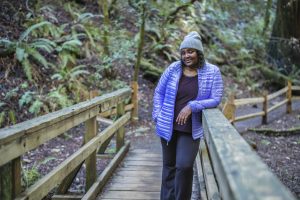 Growing up as the only sister to eight brothers in her hometown of Richmond, California, Teresa Baker was determined not to be outdone; spending time in the outdoors became her passion. Fast-forward 30 years later—the outdoors is still her passion; the only difference is that the stakes are higher. Now she spends time outdoors with the purpose of engaging communities of color in outdoor spaces, in hopes of fostering a shared sense of responsibility for environmental protection, which will benefit all humankind in the long run. Teresa is the founder of African American Nature and Parks Experience, an organization that encourages people of color to visit the great outdoors. She also blogs through her site, African American Explorations.
Growing up as the only sister to eight brothers in her hometown of Richmond, California, Teresa Baker was determined not to be outdone; spending time in the outdoors became her passion. Fast-forward 30 years later—the outdoors is still her passion; the only difference is that the stakes are higher. Now she spends time outdoors with the purpose of engaging communities of color in outdoor spaces, in hopes of fostering a shared sense of responsibility for environmental protection, which will benefit all humankind in the long run. Teresa is the founder of African American Nature and Parks Experience, an organization that encourages people of color to visit the great outdoors. She also blogs through her site, African American Explorations.
How did you become interested in environmental work?
I never looked at the work I do as being environmental. I simply wanted to engage more communities of color in the outdoors. That desire has since turned into so much more. Now I see how the two intertwine, the environment and connecting communities to these open spaces.
The need to engage underrepresented communities in work around the environment is because in 15 to 20 years, when communities of color are the number one demographic in this country, who will care for our open spaces if we have not worked diligently to engage communities of color? This is why the work I do is so vital.
What do you think are some challenges and opportunities facing women in the environmental movement today?
Women are the backbone on all social issues. Once we set our minds to change, change happens. We are the leaders that we have been waiting for, yet too many of us are waiting for permission to raise our voices and take on issues that plague society as a whole, including environmental issues. We must stand up, voice our opinions, and forge ahead in action. At stake, if we don’t act on environmental issues, is further damage to the open spaces around us. We must stop waiting for permission to be the leaders we are fully capable of being.
What are your suggestions on how WEN members can become more involved in your sector and the environmental movement?
I would love to see WEN reach out to women of color and bring us into the flock. Our voices matter too, but we are often overlooked or not thought of as being interested in matters of the environment. It must be an intentional reach, meaning not one that kindly asks if we are interested, but a direct ask that is genuine and sincere and with purpose. We need to see more women, period, involved in matters of the environment. The work being done, in large part, is done by men. I welcome the opportunity to work with WEN on campaigns that will highlight the work women are doing. Women are putting in the work, yet we are just not as visible as men.
